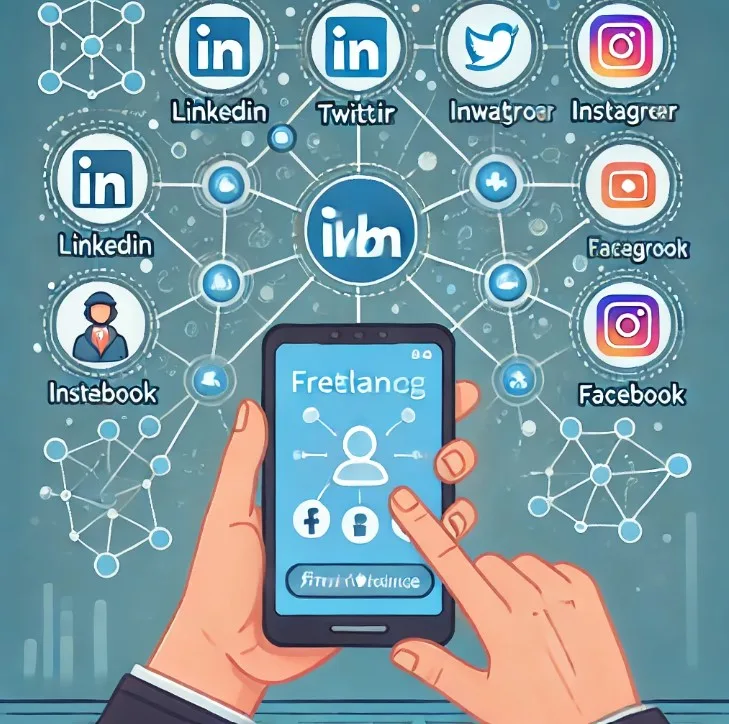Freelancers, in today’s digital age, have a world of opportunities at their fingertips—quite literally! Whether you’re a graphic designer, writer, marketer, or consultant, social media isn’t just about sharing pictures of your weekend getaway anymore. It’s a game-changing tool that lets you showcase your skills, connect with potential clients, and build a brand that stands out in a crowded marketplace. But with so many platforms available, which ones truly make a difference for freelancers? Let’s dive into the best social media platforms for freelancers and how they can help you land your next big gig.
Why Social Media Matters for Freelancers
If you think social media is just for influencers or brands with big budgets, think again! For freelancers, it’s like a digital business card mixed with a 24/7 networking event. Here’s why being active on social media is a non-negotiable part of your freelancing strategy:
Building a Personal Brand
As a freelancer, you are your own brand. Think of your social media as a store window. It should be eye-catching and show people what you are about quickly. Social media helps you create a consistent voice and image that potential clients can relate to. When your profile, content, and messages match, it shows people, “I’m a pro at what I do, and I care about my work.”
Networking and Client Acquisition
Imagine being at a party where everyone is talking about your industry. That’s what social media is like! It’s a place to meet new people, join conversations, and find clients. You don’t have to cold-call or send many emails. By using social media effectively, you can build relationships that often turn into collaborations or job offers.

Criteria for Choosing the Best Social Media Platforms
Not every platform will be the right fit for every freelancer. Before joining every social network, think about these important factors. This will help you spend your time wisely
Audience Reach
Think about where your ideal clients hang out online. Are they business professionals looking for expert advice, or are they creative enthusiasts searching for inspiration? Knowing your target audience will guide you to the platforms where you’re most likely to find them.
Engagement Features
Some platforms are better at encouraging interaction than others. You want to be in a place where you can easily connect with your audience. This includes comments, likes, direct messages, and shares. This is how you turn casual visitors into loyal followers.
Content Type Compatibility
What kind of content do you love creating? Videos, articles, visuals? Different platforms have their strengths. For example, Instagram is great for photos. LinkedIn is better for in-depth articles. Choosing a platform that aligns with your content style will make your life much easier and more enjoyable.

Top Social Media Platforms for Freelancers
Let’s take a closer look at some of the best social media platforms for freelancers and how you can use them to boost your career.
LinkedIn is like the professional networking powerhouse of the internet. If you are a freelancer wanting to meet decision-makers, show your skills, or find job opportunities, this is the place for you.
Why LinkedIn is Great for Professionals
LinkedIn allows you to create a professional profile that highlights your experience, skills, and portfolio. You can join groups in your field, meet other professionals, and publish articles to show your knowledge. It’s the perfect platform for B2B freelancers, consultants, and anyone who wants to build a strong professional network.
Instagram is not just a photo-sharing app. It is a strong tool for freelancers, especially creatives, to show their work visually. If you’re a photographer, designer, or digital artist, this is the place to shine.
Visual Portfolios and Networking
Instagram is built for visual storytelling. Use it to build a portfolio that draws in clients. Show off your projects, share behind-the-scenes work, and connect with your audience using Stories and Reels. The visual nature of the platform helps clients get a feel for your style instantly.
Twitter’s fast-paced nature makes it ideal for freelancers who want to share quick updates, industry insights, and engage in real-time conversations. It’s all about short, punchy messages that pack a punch.
Building Authority and Quick Engagement
Hashtags are your best friends on Twitter. By using relevant tags, you can reach a wider audience interested in your services. Engaging in Twitter Chats or participating in trending conversations also helps establish your expertise and gets you noticed by potential clients.
Despite its reputation as a platform for casual connections, Facebook remains a goldmine for freelancers when used correctly, especially through its Groups feature.

Community Groups and Networking
Join groups that are relevant to your industry or niche. Whether you’re a web developer or a freelance writer, there are communities filled with potential clients and collaborators looking to connect. It’s less about direct promotion and more about engaging, offering value, and building relationships.
Pinterest is a hidden gem for freelancers in creative fields. It’s not just for DIY ideas and recipes—it’s a visual search engine that can drive tons of traffic to your portfolio or website.
Best for Creative Freelancers
If you create content that can be visually represented, like infographics, mood boards, or project inspiration, Pinterest is your playground. Optimize your pins with the right keywords to make your work discoverable to potential clients.
How to Optimize Your Social Media Profiles
Simply being present on these platforms isn’t enough. To really make an impact, you need to optimize your profiles so they grab attention and convert visitors into followers or clients. Here’s how to do it:
Crafting an Engaging Bio
Your bio should be like a mini-pitch about who you are, what you do, and how you can help your audience. Make it snappy, clear, and add a touch of personality to make it memorable. Don’t forget to include a call-to-action, such as a link to your portfolio or contact details.
Consistent Branding
Consistency is key to building trust. Use the same profile photo, handle, and color scheme across all platforms to create a cohesive online presence. This makes it easy for people to recognize you, no matter where they find you.
Common Mistakes to Avoid on Social Media
Even the best freelancers can trip up on social media. To help you avoid the most common pitfalls, here are some mistakes to steer clear of:
Over-Promoting Yourself
Nobody likes to be spammed with “hire me” posts. Social media is about building relationships, not just selling. Focus on providing value and showing your expertise rather than constantly promoting your services.
Ignoring Engagement
Engaging with your audience is crucial. If someone comments on your post, respond. If someone shares your content, thank them. This simple act of engagement goes a long way in building a loyal following.
Conclusion
The best social media platforms for freelancers depend largely on your field and where your clients are most active. LinkedIn is great for professional networking, Instagram for visual portfolios, Twitter for real-time engagement, Facebook for community building, and Pinterest for creative inspiration. Pick the platforms that align with your skills, optimize your profiles, and engage genuinely with your audience to see your freelancing career soar!
Frequently Asked Questions – FAQs
Q1: Which social media platform is best for building a professional network as a freelancer?
A1: LinkedIn is the best platform for building a professional network and connecting with industry leaders.
Q2: How can freelancers use Instagram to attract clients?
A2: Freelancers can use Instagram by creating a visual portfolio of their work, engaging with followers through Stories, and using relevant hashtags to increase visibility.
Q3: Is Facebook still relevant for freelancers in 2024?
A3: Yes, Facebook remains relevant, especially through its Groups, where freelancers can join communities, share their expertise, and connect with potential clients.
Q4: What is the advantage of using Pinterest as a freelancer?
A4: Pinterest acts like a visual search engine that helps creative freelancers showcase their work and drive traffic to their website or portfolio.
Q5: How can Twitter help freelancers gain industry recognition?
A5: Twitter helps freelancers by enabling them to join conversations, share quick insights, and use hashtags to gain visibility and establish themselves as industry experts.